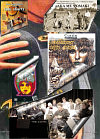Alexandria Virtual Cultural Centre of WA
The Three Nexal registers:
Identity, peripheral cultural industry, alternative cultures
Nikola Janović and Rastko Močnik
References (quotes)
I - “… trade in cultural goods multiplied by five between 1980 and 1998. Cultural industries are growing exponentially … they are to become a central pillar of the information society …” (Unesco, 2003).
II - In a similar perspective, J.-L. Amselle (Amselle, 2001) proposes the concept of branchement, "junction, connection".
III - A study of national reports of the EU countries within the Council of Europe cultural policy evaluation program concludes: “The ideology that prevailed in the reports with later dates suggests that a ‘cultural policy based on enterprise’ can presumably better meet the needs of consumers than the state regulation of ‘access’ to culture”. (Breznik, 2004).
IV - An anecdote to illustrate this point. According to magazine Svet (March 6, 2004), the winning song of the Serbia and Montenegro Eurosong national contest “Lane moje / My bamby” (that was to win second position at the Eurovision song contest in Istanbul, May 15, 2004) may be just an arrangement of the composition “Sen gelmez oldun”, composed by Elekber Tahijev and performed by Azerbaidjani instrumentalist Alihan Samedov. The original composition figures in the compilation Buddha-bar V (1993), produced to serve as musical background in Buddha-bars across Germany, France and Spain.
V - Although a historical chance seems to have been destroyed when neo-liberal core-capitalism adopted peripheral nationalist restoration (cf. Lešnik, 1999; Breznik, 1995), alternative cultural and political practices, culturally so productive and socially so inventive during socialism, are now entering again upon the historical scene. (Cf. Gregorčič and Kovačič, 2003; Bibič, 2003.)
VI - “Cultural diversity” was substituted for “cultural exception”; other attempts were "cultural exclusion", " cultural specificity " (Regourd, 1993; Gournay, 2002; Regourd, 2004).
VII - Mauss, 1985.
VIII - Marx, 1962.
IX - Husson, 1999.
X - Boltanski and Chiapello, 1999.
XI - Caillé, 2005.
XII - Foucault, 2004.
XIII - Gramsci, 1966, translation mine.
XIV - "Culturalisation" means "de-politicisation" within the specifically modern concept of culture. Maja Breznik shows how the emergence of an “autonomous sphere of culture and art” in European renaissance was at the same time the result of class struggles and a decisive factor in the march to power of the new proto-capitalist classes (Breznik, 2005).
XV - Buden, 2002; Kuzmanić, 2002.
XVI - As much as Gellner's formula “One State, one Nation, one Culture” can be contested for the “classical” nations (Močnik, 1994; Wallerstein, 1995), it probably holds for contemporary cultural “identitary” constructions.
XVII - In 1992, those "persons from the republics of Socialist Federal Republic Yugoslavia" who had not been granted Slovene citizenship, were deprived of their status of permanent residents. This "purposeful political act of a discriminatory nature" (Dedić et. al., 2003) is now commonly referred to as the "erasure". In 2003, the Association of the Erased Residents of Slovenia had 18.305 members. (ECRI, 2003.)
XVIII - Individuals from former republics of SFRY living in Slovenia are “immigrants” both in “scare quotes” – since most of them have been living in Slovenia for the larger part of their lives, and many have been born in Slovenia –, and in “quotation marks”, since this is how legislative and policy documents refer to them, while they are formally denied the status of minorities.
IXX - This violence has been ruled unconstitutional by two decisions of the Constitutional Court (1999 and 2003).
XX - “Immigrants” are isolated as far as they are excluded by the majority population – and they are integrated into solidarity networks they establish among themselves (Dragoš and Leskošek, 2003)
XXI - Foucault, 1991.
XXII - Schmitt, 1922.
XXIII - For an analysis of the processes mystified by the culturalist jargon, see Gambino, 2003.
XXIV - Yugoslavia was destroyed by the practices led by the idea of the "sovereignty of the majority ethnic group" (Karamanić, 2003; Kržišnik Bukić, 2005).
XXV - We will adapt the conceptual apparatus proposed by the authors in: Ducrot, 1996; Anscombre and Ducrot, 1997. Cf. Močnik, 2002.
XXVI - The topos evoked remains on the level of the “background”; we will mark this by writing T above the horizontal line under which we will present the [argument –> conclusion] chain
XXVII - In Ducrot’s terminology, the two converse topical forms of a topos T are opposed as FT’ (+P –> +Q) vs. FT’’ ( – P –> – Q). Here, it is: FT’ (+P –> – Q) vs. FT’’ (– P –> – Q).
XXVIII - Wallerstein, 1995.
XXIX - Čolović, 2000.
XXX - The turbo-folk star Ceca Ražnatović (Svet, November 29, 2003): “…I continue to sing love songs – the subject is unhappy love.”
XXXI - The video “Tetovaža /Tattoo/” (Indira Radić) presents an encyclopaedic tour across the metamorphoses of the former neo-folk genres. It starts in the ambiance of what is the present existence of the former “mahala-garden” genre: a sleeping room in a block apartment, from where the singer descends to the parking lot (what used to be the “sokak”), and drives along a metropolitan boulevard (the “landscape” – what used to be fields and hills), stops on a river bank under a bridge (a scenery that could well figure in a traditional rustic genre – only that the banks are cemented, the river invisible, and the bridge is a highway bridge); etc.
XXXII - The song “Kućo moja / My house” by Miloš Bojanić begins in the classical decasyllabic verse and with the traditional “catching-up” start of the melody. The song and the video then systematically destroy the standard inventory of home-nostalgia topoï.
XXXIII - Cf. the video of the song “Hajde, brate, da zapjevamo / Let us sing, brother”, Goran and Miloš Bojanić.
XXXIV - ”Socially committed” refers to practices and products; "civic" refers to the status of practitioners and locations. "Civic" is opposed to "public" in its legal sense of "established by the state or local authorities" and "state-financed", and to "commercial" in its sense of "profit-oriented" and "operating on the market"
XXXV - A pop singer from Split, popular across the former Yugoslavia
XXXVI - A third-generation classic of the turbo-folk.
XXXVII - “The king of the Gipsy music”; appreciated in Central and South East Europe.
XXXVIII - For the socio–cultural profile of the neo-folk audience, see: Milena Dragičević–Šešić, 1994
XXXIX - Ljubljana-based break-beat DJ Borka, interview.
XXXX - At best, reference to this tradition is used defensively in favour of the “alternative” or “independent” cultural production.
XXXXI - Goldmann, 1959.
XXXXII - Debord, 1992.
XXXXIII - A systemic cycle of capital accumulation consists of an increasing A-phase and a decreasing B-phase (Arrighi, 1996; Wallerstein, 1998).
XXXXIV - Arrighi, 1996.
XXXXV - Debord, 1992; Jameson, 1991
PAGE - 10 PREVIOUS PAGE PAGE - 10
Alexandria - Acting on the brighter future for the professional arts in Australia






